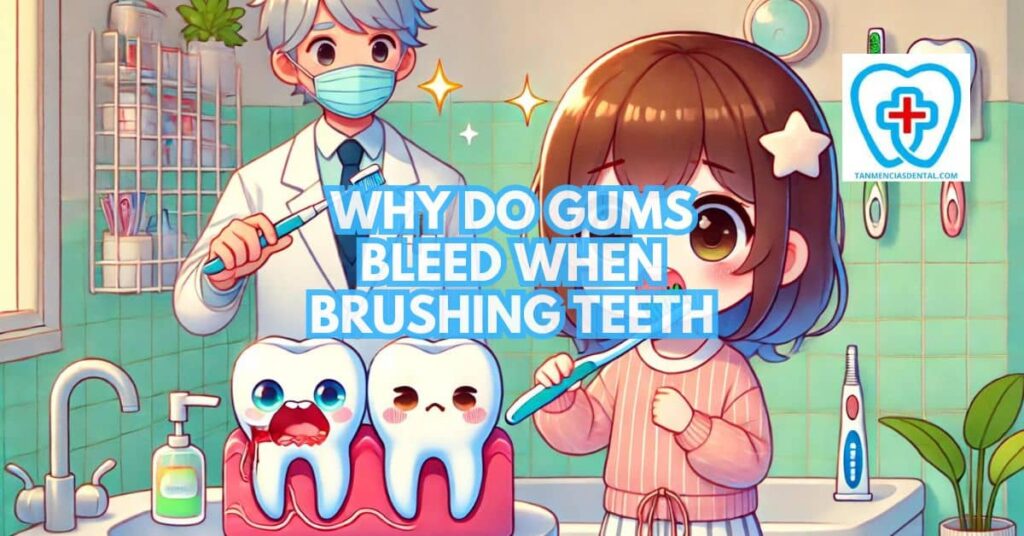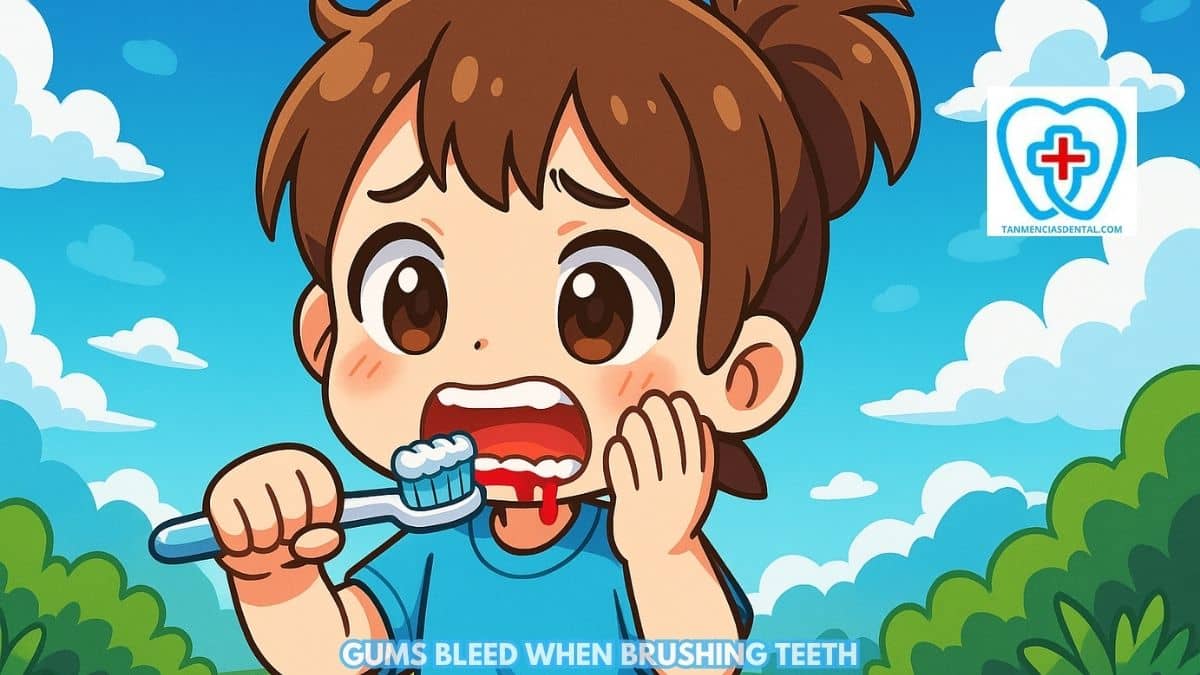Many people wonder why their gums bleed when brushing teeth, and this problem often points to irritation or early gum disease.
Bleeding can happen due to plaque buildup, poor brushing habits, vitamin shortages, or changes in the body that affect gum health.
Some medical conditions and certain medicines can also make the gums more sensitive and easier to injure.
If the bleeding happens often, it is important to understand what is causing it so you can choose the right steps to fix the problem.
Learning the common causes can help you protect your gums and prevent more serious issues later on.
1. How Gingivitis Causes Bleeding Gums
Gingivitis is a mild form of gum disease that begins when plaque builds up on the teeth and irritates the surrounding gum tissue.
Plaque is a sticky layer of bacteria that forms on the teeth, especially in spots that are not cleaned well with brushing and flossing.
As the plaque grows, it causes the gums to swell and turn red, which are common symptoms of gingivitis that many people may overlook.
The irritated gums can bleed easily during brushing or flossing because the tissue becomes weak and sensitive.
Even though gingivitis is usually painless, these changes show that the gums are not healthy and need attention.
If the condition is not treated, it can slowly lead to periodontal disease, which affects the deeper tissues that hold the teeth in place.
This more serious stage can cause gum recession and bone loss that may result in loose or missing teeth.
Daily brushing and flossing, along with regular dental cleanings, can remove plaque early and stop gingivitis from getting worse.
🦷 Tips for Optimal Dental Care While You Sleep
2. The Impact of Periodontitis on Bleeding Gums
Periodontitis is a more advanced gum disease that develops when gingivitis is left untreated.
This condition affects the deeper structures of the gums and can lead to tooth loss if not properly managed.
Bleeding gums are a common symptom of periodontitis, along with bad breath, receding gums, and loose teeth.
The damage caused by periodontitis is often irreversible, so early detection is crucial for treatment.
Deep cleaning procedures and, in some cases, surgery may be needed to manage periodontitis effectively.
🦷 Combining Baking Soda and Salt for Teeth: Tips for Safe and Effective Use
3. How Brushing Technique Can Lead to Gum Bleeding
Brushing too hard or using the wrong type of toothbrush can cause your gums to bleed because the pressure hurts the soft tissue.
Hard bristles and strong brushing motions can scrape the surface of the gums and create small cuts that bleed easily.
Using a soft-bristled toothbrush and gentle circular motions helps clean the teeth without harming the area along the gum line.
These gentle movements remove plaque while keeping the gums from becoming sore or inflamed.
If you continue to use improper brushing techniques, you may develop gum recession and tooth sensitivity as the tissue slowly wears away.
Switching to safer habits can protect your gums, reduce bleeding, and keep your mouth healthier over time.
🦷 Understanding How Long A Dentist Appointment Takes
4. The Role of Oral Health in Preventing Bleeding Gums
Good oral health is important because it helps prevent some of the most common causes of bleeding gums.
Regular brushing, flossing, and professional cleanings help remove bacteria before they form a buildup of dental plaque.
If plaque is not removed, it can harden into tartar, which sticks tightly to the teeth and can only be removed by a dentist.
This tartar can irritate the gums and make them swollen, which often leads to bleeding when you brush.
Keeping your mouth clean also lowers your chance of getting gum diseases like gingivitis and periodontitis.
Healthy habits such as brushing twice a day and cleaning between your teeth help keep the gums strong.
By caring for your mouth every day, you can protect your gums and reduce bleeding during brushing.
🦷 How to Choose the Best Electric Toothbrushes for Receding Gums

5. Vitamin Deficiencies: A Possible Cause of Bleeding Gums
A deficiency in essential vitamins, particularly vitamin C, can lead to bleeding gums.
Vitamin C is necessary for the repair and maintenance of healthy gum tissues, and its absence can weaken blood vessels, leading to easy bleeding.
People who don’t consume enough fruits and vegetables may be at a higher risk for gum problems related to vitamin deficiencies.
In addition, low levels of vitamin K, which is crucial for blood clotting, can also contribute to gum bleeding.
Including a variety of fruits, vegetables, and leafy greens in your diet can help prevent this issue.
🦷 Are Dentists Physicians? Unpacking the Professional Titles and Training
6. How Systemic Diseases Can Cause Bleeding Gums
Some health conditions can cause your gums to bleed, even when you brush gently and take good care of your teeth.
Diseases like diabetes, leukemia, and blood-clotting problems can weaken your gums and make them bleed more easily.
Illnesses that affect the immune system, such as HIV or some cancer treatments, can also make it harder for your gums to stay healthy.
In these cases, brushing does not cause the bleeding because the gums are already fragile due to the underlying medical condition.
If gum bleeding continues even with good oral care, it may be a sign to visit a doctor for a full health check.
🦷 Can You Get Rid Of Gingivitis Permanently? Prevention Tips
7. Medication Side Effects That Can Cause Bleeding Gums
Some medications, like blood thinners, can cause gums to bleed more easily.
These drugs reduce the blood’s ability to clot, making even mild irritation to the gums, such as brushing, result in noticeable bleeding.
Other medications, such as antihypertensive drugs, may lead to dry mouth, which can contribute to gum irritation and bleeding.
Always inform your dentist about any medications you are taking, as they can recommend appropriate care.
In some cases, adjusting your oral hygiene routine can help minimize gum bleeding caused by medication.
🦷 Can Dentists Do Braces? Why Knowing This Matters for Your Smile
8. Hormonal Changes and Their Effect on Bleeding Gums
Hormonal fluctuations, such as those during pregnancy, menstruation, or menopause, can increase gum sensitivity and lead to bleeding.
Higher levels of hormones can cause an exaggerated response to plaque buildup, making gums more inflamed and prone to bleeding.
Pregnant women often experience a condition called pregnancy gingivitis that causes swollen, tender gums that bleed easily.
Similarly, hormonal changes during menstruation or menopause can lead to temporary gum issues.
Maintaining good oral hygiene during these periods can help manage these symptoms and reduce gum bleeding.
🦷 Affordable Oral Surgery Options for Every Budget: Smile Without the Strain
9. Smoking and Its Role in Bleeding Gums
Smoking weakens the immune system and reduces blood flow to the gums, making them more prone to infections and bleeding.
Smokers are significantly more likely to develop gum disease, which can cause persistent gum bleeding.
The harmful chemicals in tobacco can also slow down the healing process, making it difficult for gums to recover from irritation or injury.
Additionally, smoking reduces the effectiveness of oral hygiene practices, allowing plaque to build up more easily.
Quitting smoking is one of the most effective ways to improve gum health and reduce bleeding.
🦷 How Can Dentists Help Athletes? Maximizing Athletic Performance
10. When to See a Dentist for Bleeding Gums
If your gums bleed often or the bleeding becomes more noticeable, it is important to visit a dentist for help.
Constant bleeding can be a sign of gum disease, including problems like gingivitis or periodontitis that may get worse without treatment.
A dentist can examine your gums closely to see if the bleeding is caused by plaque, infection, or another health condition.
They may also check for loose teeth, gum recession, or areas where bacteria are collecting.
Getting care early can stop the problem from spreading and protect the tissues that support your teeth.
Regular dental visits make it easier to catch changes in your gum health before they turn into more serious issues.
🦷 Basic Dental Needs in Marikina
11. Effective Ways to Stop Bleeding Gums and Improve Dental Health
To stop bleeding gums, focus on gentle but consistent oral care habits that keep your mouth clean.
Use a soft-bristled toothbrush and brush your teeth twice each day while paying close attention to the gumline so you can remove buildup without hurting the tissue.
Floss once a day to clear away plaque and food pieces that stay between the teeth where a toothbrush cannot reach.
Rinsing with warm salt water can also soothe irritated gums and help reduce swelling.
An antibacterial mouthwash may lower the amount of harmful bacteria in your mouth and support healthier gums.
Regular dental checkups and a balanced diet filled with vitamins and minerals are important for preventing gum bleeding and keeping your teeth and gums strong.
🦷 Tan-Mencias Dental Clinic – Dental Treatments in Marikina
👨⚕️ Conclusion
Taking care of your gums is essential for long-term dental health and overall well-being.
Bleeding gums may be a sign of underlying issues that can lead to more serious problems if left untreated.
By maintaining good oral hygiene, addressing dietary deficiencies, quitting smoking, and seeking professional dental care, you can prevent gum bleeding and protect your gums.
Consistency in your oral care routine is key to keeping your gums healthy.
Remember that investing in your gum health today can save you from complications in the future.
❔ FAQs
1. Why do my gums bleed only when I brush my teeth?
Your gums may bleed because plaque has built up and made the tissue weak and irritated.
Brushing then disturbs the inflamed area and causes bleeding.
If this happens often, it is important to check your brushing habits and the health of your gums.
2. Should I stop brushing if my gums bleed?
You should not stop brushing because this can allow more plaque to build up and make the bleeding worse.
Use a soft toothbrush and gentle strokes to clean your teeth without hurting your gums.
If the bleeding continues, a dentist can help find the cause.
3. Can vitamins help stop bleeding gums?
Low levels of vitamin C and vitamin K can make your gums bleed more easily.
Eating fruits, vegetables, and leafy greens can help your body get these vitamins.
If your diet is already balanced and bleeding continues, another cause may be present.
4. When are bleeding gums a sign of a serious health problem?
Bleeding gums can sometimes point to medical issues like diabetes, leukemia, or problems with blood clotting.
These conditions can make the gums fragile, even when brushing gently.
If you notice bleeding along with other unusual symptoms, it is best to see a doctor.
5. How long does it take for bleeding gums to get better?
If bleeding is caused by plaque or brushing too hard, gums often improve within a few days of gentle and consistent cleaning.
Vitamin-related bleeding may take longer because your body needs time to restore healthy levels.
If bleeding does not improve after one to two weeks, you should see a dentist for help.
😁 Self-Promotion
Visit Tan-Mencias Dental Clinic in Parang, Marikina City, where we offer professional and caring dental services for you and your family.
Our team is ready to help you with all your dental needs, ensuring a comfortable and friendly experience.
You can reach us with any questions by calling 0917-145-1074, sending a message through our Facebook page, or using our website’s contact form.
We’re here to assist you in achieving the healthy smile you deserve.
Let us take care of your dental health with a warm and welcoming touch!

